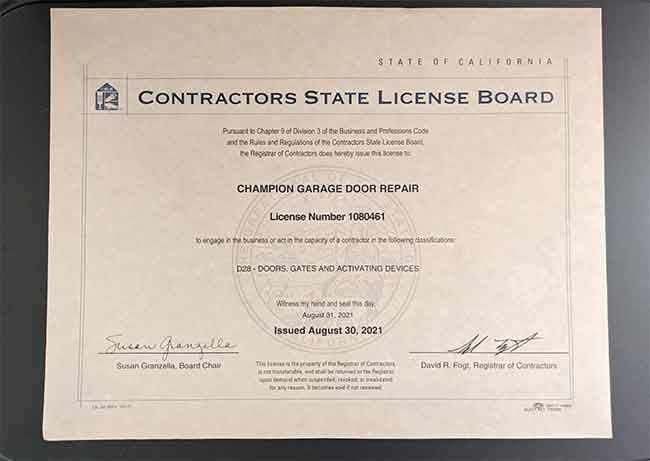Companies and individuals who perform construction and home improvement work in the US, including the repair, service, and installation of garage doors, openers, and springs, are required by law to have and maintain an appropriate contractor license. A licensed garage door contractor is someone recognized by state authorities as capable of performing proper garage door repair and installation work.

Here’s why you should always verify that a garage door repair company is licensed before hiring them for your overhead garage door projects:
1. Background Checks
Applicants are required to pass mandatory background screenings intended to identify individuals with criminal histories or other red flags that might render them unfit to work as garage door repair contractors. These preliminary background checks help promote trust and maintain quality within the garage door repair industry. Additionally, they help mitigate the risk of consumers falling victim to unscrupulous or incompetent contractors.
2. Journey-Level Experience
Applicants must demonstrate a minimum of four years of journey-level experience in the garage door repair industry. This means that the applicant is a fully qualified and experienced worker, capable of independently performing repairs, replacements, and installations of garage doors, openers, and springs, without supervision.
3. Contractor’s Examination
Licensed garage door repair contractors must pass an exam that verifies their ability to perform work in accordance with industry standards and legal requirements. This exam also ensures that the contractor understands local laws, rules, and codes, as well as the basics of running a contracting business.
4. Understanding of Contracts
Garage door repair contractors are required to have proper understanding of contracts, which is an agreement between two parties or more. Writing a proper contract includes outlining the repair or installation work, project schedule, materials, total cost, and the legal terms and conditions. Having a proper contract in place not only helps consumers understand the scope of work but also helps to avoid misunderstandings and resolve disputes if they occur.
5. Bond Requirements
Garage door repair contractors must have a bond to provide financial protection for consumers. Essentially, a contractor’s bond serves as insurance, compensating clients if the contractor fails to complete the project or uphold contractual agreements. This bond protects consumers against financial losses resulting from contractor negligence, incomplete garage door repair or installation work, or other contract breaches. Moreover, bonds offer clients reassurance that the contractor is financially stable and capable of fulfilling their commitments.
How to Check a Garage Door Company’s License
To contract garage door repair work in California, a company should have an active D-28 – Doors, Gates, and Activating Devices type of license, which allows them to install, modify, or repair all types of residential, commercial, or industrial overhead garage doors, gates, and power-activated doors.
Consumers can search and verify a contractor’s license on the official source relevant to their location. For example, in Orange County and California, consumers can check a license on the CSLB website by searching for the contractor’s license number or business name. It’s also an opportunity to confirm that the business is genuinely local to your area, as some garage door repair companies may use fake addresses.
A contractor’s license number is typically found on the company’s business cards, invoices, and official website, often located in the footer (the bottom section of the website). It’s crucial to verify that the garage door repair company you intend to hire is licensed and legitimate before sharing any personal information. This precautionary step helps prevent fraud, ensures quality workmanship, and minimizes complications.
Why Unlicensed Garage Door Repair Workers Can Cause Problems
Unlicensed garage door repair workers exist in the industry, and hiring them carries the following risks:
Risk of Liability
Unlicensed workers who get injured while performing garage door repair and installation work on the consumer’s property have the right to sue for medical expenses. This leaves consumers liable and potentially responsible for paying compensation and medical expenses out of pocket. According to research published in 2007, nonfatal injuries in the construction industry were more costly than average, at $42,000 per case.
Lack of Bonding or Insurance
Unlicensed workers typically lack access to contractor bonds and do not carry general liability insurance, leaving consumers unprotected from incomplete contracts or property damage.
Permits and Property Value
Unlicensed workers aren’t able to obtain the proper building permits, and the work performed on a given property will not be officially recognized, in addition to being considered unsafe. Regarding garage doors, this information must be disclosed to potential home buyers and will negatively affect the property’s price.
Risk of Voided Warranties
An unlicensed garage door worker may lead to any warranties associated with the garage doors or openers being voided. Therefore, if repair or installation work is performed by unlicensed workers, subsequent replacements may not be covered by the manufacturer’s warranty.
Consequences of Working Without a License
Unlicensed workers engaging in the repair, installation, and replacement of garage doors, openers, and springs in California risk misdemeanor charges, requiring appearance before a Superior Court judge. If found guilty for a first offense, penalties include:
- Up to a $5,000 fine.
- Up to six months’ jail sentence.
- Up to $1,500 in administrative fees.
For a second offense, the punishment includes a mandatory 90-day jail sentence and a fine of 20% of the contract or $5,000.
If an unlicensed worker uses another contractor’s license or deceives consumers into believing they are licensed, they may face felony charges. A guilty verdict may result in state prison time.
How to Report an Unlicensed Garage Door Repair Worker
The California Contractors State License Board operates a Statewide Investigative Fraud Team to address consumer complaints regarding individuals not properly licensed to perform garage door repair and installation work.
Consumers can report violations by filling out the SWIFT Lead Referral Form, which should be sent to the appropriate SWIFT office for processing. However, for the complaint to be investigated, the total cost of labor and materials for the job must be at least $500.
Consumers in California are not legally obligated to pay an unlicensed worker for their services. Furthermore, the consumer cannot be sued by the worker or contractor for non-payment.
Industry regulations and standards at the state and local levels exist not only to protect consumers from financial liability but also to establish binding duties, impose responsibilities, ensure proper training of garage door repair contractors, and uphold quality standards.







